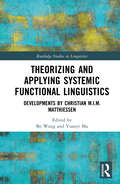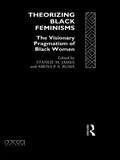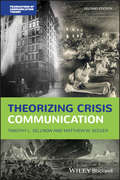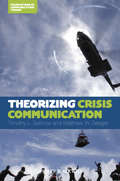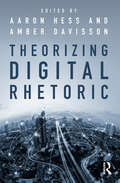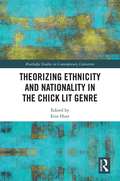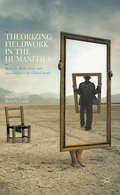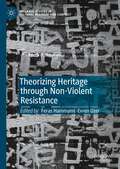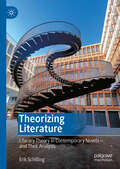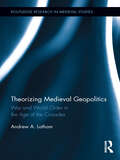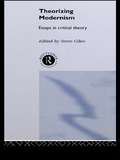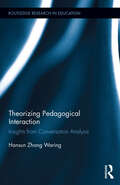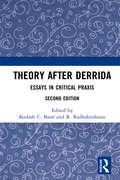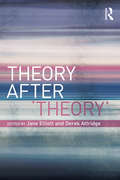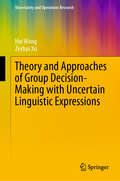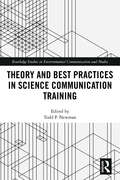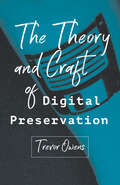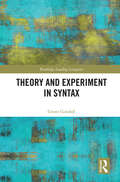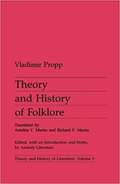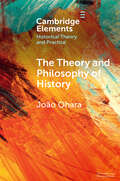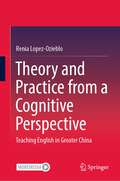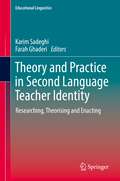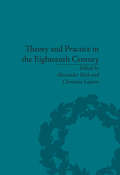- Table View
- List View
Theorizing and Analyzing Agency in Second Language Learning
by Xuesong Andy Gao Ping DetersThis book showcases how language learner agency can be understood and researched from varying perspectives by providing, for the first time, a collection of diverse approaches in one volume. The volume is organised into three main sections:the first sections offers an introduction to varying theoretical approaches to agency; the second section presents analyses of agency in a variety of empirical studies; and the third section focuses on the pedagogical implications of data-based studies of agency. The volume includes the work of researchers working in languages including English (ESL and EFL), Greek, Spanish, Swedish, Italian, Hindi, Marathi, Gujarati and Truku (an indigenous language in Taiwan) and with both child and adult language learners. This collection will serve as a key reference for researchers of language learning and teaching, sociolinguistics and language and identity.
Theorizing and Applying Systemic Functional Linguistics: Developments by Christian M.I.M. Matthiessen (Routledge Studies in Linguistics)
by Bo Wang and Yuanyi MaThis collection reflects on developments in the field of Systemic Functional Linguistics (SFL) as embodied in the work of Christian M.I.M. Matthiessen, highlighting his diverse contributions to the field from theoretical and applied perspectives. The book surveys Matthiessen’s academic career and illustrates the myriad ways in which his work has reverberated through to current innovations in SFL research. The book also exhibits his theoretical contributions to major linguistic topics and his influence on the development of SFL. Written by some of the world’s foremost scholars in the field, chapters cover such topics as theories of SFL and its applications in different domains as well as the developmental trajectories of SFL in major geographic areas. Addressing the key issues in SFL through the lens of Matthiessen’s career, this book is an accessible resource for students and scholars in systemic functional linguistics, as well as those interested in the systemic functional approach in related areas within linguistics.
Theorizing Black Feminisms: The Visionary Pragmatism of Black Women
by Stanlie M. James Abena P. A. BusiaFirst published in 1993. Routledge is an imprint of Taylor & Francis, an informa company.
Theorizing Crisis Communication (Foundations of Communication Theory Series)
by Matthew W. Seeger Timothy L. SellnowExplore the major theories within crisis communication, fully revised and updated Theorizing Crisis Communication provides a comprehensive and state-of-the-art review of both current and emerging theoretical frameworks designed to explain the development, management, and consequences of natural and human-caused crises. A critique of the many theoretical approaches of crisis communication, this volume provides readers with an in-depth understanding of the management, response, resolution, and significance of failures in corporate responsibility, as well as destructive global events such as pandemics, earthquakes, hurricanes, tsunamis, chemical spills, and terrorist attacks. This second edition contains new theories from related subfields and updated examples, references, and case examples. New chapters discuss metatheoretical considerations and theoretical advancements in the study of social media. Throughout the text, the authors highlight similarities, patterns, and relationships across different crisis types and offer insight into the application of theory in the real world. Integrating work from organizational studies, social sciences, public relations, and public health, this book: Covers a broad range of crisis communication theories, including those relevant to emergency response, risk management, ethics, resilience and crisis warning, development, and outcomes Presents theoretical frameworks based on research disciplines including sociology, psychology, applied anthropology, and criminal justice Provides clear and compelling examples of application of theory in contexts such as rhetoric, mass communication, social media, and warning systems Offers a systematic and accessible presentation of topics by explaining each theory, describing its applications, and discussing its advantages and drawbacks Theorizing Crisis Communication, Second Edition, is the perfect textbook for advanced undergraduate and graduate students of crisis and risk communication, and an importance reference for scholars, researchers, and practitioners in fields including crisis communication, emergency management, disaster studies, sociology, psychology, and anthropology.
Theorizing Crisis Communication
by Timothy L. Sellnow Matthew W. SeegerTheorizing Crisis Communication presents a comprehensive review and critique of the broad range of theoretical frameworks designed to explain the role of communication in the development, management, and consequences of natural and man-made crises.Brings together the variety of theoretical approaches emerging in the study of crisis communication into one volume for the first time.Summarizes theories from such diverse perspectives as rhetoric, risk management, ethics, mass communication, social media, emergency response, crisis outcomes, and warning systems, while presenting clear examples of how the theory is applied in crisis communication researchPresents theoretical frameworks generated by research from many disciplines including sociology, psychology, applied anthropology, public health, public relations, political science, organizational studies, and criminal justiceAn essential tool for a comprehensive understanding of the onset, management, response, resolution, and ultimate meaning of these devastating world events
Theorizing Digital Rhetoric
by Aaron Hess Amber DavissonTheorizing Digital Rhetoric takes up the intersection of rhetorical theory and digital technology to explore the ways in which rhetoric is challenged by new technologies and how rhetorical theory can illuminate discursive expression in digital contexts. The volume combines complex rhetorical theory with personal anecdotes about the use of technologies to create a larger philosophical and rhetorical account of how theorists approach the examinations of new and future digital technologies. This collection of essays emphasizes the ways that digital technology intrudes upon rhetorical theory and how readers can be everyday rhetorical critics within an era of ever-increasing use of digital technology. Each chapter effectively blends theorizing between rhetoric and digital technology, informing readers of the potentiality between the two ideas. The theoretical perspectives informed by digital media studies, rhetorical theory, and personal/professional use provide a robust accounting of digital rhetoric that is timely, personable, and useful.
Theorizing Ethnicity and Nationality in the Chick Lit Genre
by Erin HurtScholars and readers alike need little help identifying the infamous Bridget Jones or Carrie Bradshaw. While it is no stretch to say that these fictional characters are the most recognizable within the chic lit genre, there are certainly many others that have helped define this body of work. While previous research has focused primarily on white American chick lit, Theorizing Ethnicity and Nationality in the Chick Lit Genre, takes a wider look at the genre, by exploring chick lit novels featuring protagonists from a variety of ethnic backgrounds set both within and outside of the US.
Theorizing Fieldwork in the Humanities: Methods, Reflections, and Approaches to the Global South
by Shalini Puri and Debra A. CastilloThis volume, the first of its kind, launches a conversation amongst humanities scholars doing fieldwork on the global south. It both offers indispensable tools and demonstrates the value of such work inside and outside of the academy. The contributors reflect upon their experiences of fieldwork, the methods they improvised, their dilemmas and insights, and the ways in which fieldwork shifted their frames of analysis. They explore how to make fieldwork legible to their disciplines and how fieldwork might extend the work of the humanities. The volume is for both those who are already deeply immersed in fieldwork in the humanities and those who are seeking ways to undertake it.
Theorizing Heritage through Non-Violent Resistance (Palgrave Studies in Cultural Heritage and Conflict)
by Feras Hammami Evren UzerThis book is about the entanglement of heritage and resistance in different situations of conflicts, and the opportunities this entanglement may provide for social justice. This entanglement is investigated in the different contributions through theoretical and empirical analyses of heritage-led resistance to neoliberal economic development, violation of the subaltern, authorised narratives and state-invented traditions, colonialism and settler colonialism, and even dominating discourses of social movement, to name just a few. Crossing the disciplinary boundaries of heritage and resistance studies, these analyses bring new insights into several timely debates, especially those concerned with the interrelated critical questions of displacement, gentrification, exclusion, marginalization, urbicide, spatial cleansing, dehumanization, alienation, ethnic cleansing and social injustice. Following our purposeful and future-driven approach, we wish to bring new energy to the field of heritage studies through the focus on the potential of heritage and resistance for hopeful change rather than adding to the field yet another overwhelming engagement with conflict and war.
Theorizing Literature: Literary Theory in Contemporary Novels – and Their Analysis
by Erik SchillingThis book offers an analytical model for the interpretation of theory-informed novels – American, English, French, German, and Italian – from the past 50 years. Works discussed include Laurent Binet’s The 7th Function of Language, Italo Calvino’s If on a Winter’s Night a Traveler, Patricia Duncker’s Hallucinating Foucault, Umberto Eco’s Foucault’s Pendulum, David Lodge’s Small World, and Juli Zeh’s Dark Matter. Erik Schilling shows how these works not only incorporate elements of theory in playful, intertextual ways, but productively work with theory – for instance, by elaborating the complexities of the roles of author and reader or by confronting the quest for meaning with an infinite network of signs. Schilling argues that the novels do not merely adopt theory; they create theory – and this theorizing literature requires new forms of interpretation.
Theorizing Medieval Geopolitics: War and World Order in the Age of the Crusades (Routledge Research in Medieval Studies)
by Andrew LathamOver the past two decades or so, medieval geopolitics have come to occupy an increasingly prominent place in the collective imagination—and writings—of International Relations scholars. Although these accounts differ significantly in terms of their respective analytical assumptions, theoretical concerns and scholarly contributions, they share at least one common – arguably, defining – element: a belief that a careful study of medieval geopolitics can help resolve a number of important debates surrounding the nature and dynamics of "international" relations. There are however three generic weaknesses characterizing the extant literature: a general failure to examine the existing historiography of medieval geopolitics, an inadequate account of the material and ideational forces that create patterns of violent conflict in medieval Latin Christendom, and a failure to take seriously the role of "religion" in the geopolitical relations of medieval Latin Christendom. This book seeks to address these shortcomings by providing a theoretically guided and historically sensitive account of the geopolitical relations of medieval Latin Christendom. It does this by developing a theoretically informed picture of medieval geopolitics, theorizing the medieval-to-modern transition in a new and fruitful way, and suggesting ways in which a systematic analysis of medieval geopolitical relations can actually help to illuminate a range of contemporary geopolitical phenomena. Finally, it develops an historically sensitive conceptual framework for understanding geopolitical conflict and war more generally.
Theorizing Modernisms: Essays in Critical Theory
by Steve GilesAt a time when postmodernism seems to have achieved a dominant position in cultural and critical theory, the contributors to this volume present a much needed corrective to the misleading images of modernism which have dominated recent debate. Theorizing Modernisms includes an account of European modernism, and analysis of the work of Apollinaire and Aberti, Wyndham Lewis and Mike Johnson, and Kert Schwitters. Steve Giles provides a much needed overview of the relationship between modernism and the avant-garde, postmodernism and modernity.
Theorizing Pedagogical Interaction: Insights from Conversation Analysis (Routledge Research in Education)
by Hansun Zhang WaringPedagogical interaction can be observed through many different landscapes, such as the graduate seminar, the writing skills center, the after-school literacy program, adult ESL classrooms, and post-observation conferences. By viewing these settings through the lens of conversation analysis, this volume lays the groundwork for three principles of pedagogical interaction: competence, complexity, and contingency. The author explores these principles and how they inform what makes a good teacher, how people learn, and why certain pedagogical encounters are more enlightening than others. Drawn from the author’s original research in various pedagogical settings, this volume collects empirical insights from conversation analysis and contributes to theory building. Theorizing Pedagogical Interaction will appeal to students and scholars in applied linguistics, educational linguistics, and communication studies who are interested in the discourse of teaching and learning.
Theorizing the Ideal Sovereign
by Daisy DeloguTheorizing the Ideal Sovereign, examines the ways in which vernacular biographies of kings from the later French Middle Ages reflected and contributed to transformations in late-medieval political and philosophical thought. Using a lens of literary analysis for works that have more often been read as historical source documents, Daisy Delogu demonstrates how theories of kingship evolved in the period of the "rediscovery" of Aristotle, the rise of the vernacular as a language of ethics and philosophy, and the Hundred Years' War. By means of a series of close readings of Jean de Joinville's Vie de Saint Louis, Guillaume de Machaut's Prise d'Alixandre, and Christine de Pizan's biography of Charles V, Delogu examines the ways in which biographical writings on kings could advance precise political aims. She also shows how these texts contributed to nascent ideas of nationhood, exerted pressure upon traditional ideals of kingship, and ultimately redefined the theoretical and practical bases of medieval kingship. This study of vernacular kings's lives illuminates the important role that literary works played in shaping ideas more traditionally discussed in legal, historical, or institutional terms. Theorizing the Ideal Sovereign restores late medieval kings's lives to ethical and political conversations of which they were an integral part, and revives the lively interaction between texts and readers that formed the basis for medieval reading experiences.
Theory after Derrida: Essays in Critical Praxis
by R. Radhakrishnan Kailash C. BaralA critical anthology that re-examines Jacques Derrida’s thought by way of theory and praxis, this volume reflects on his striking legacy and the future of theory. Among contemporary thinkers, Derrida challenges not only our ways of thinking but also hitherto methods of inquiry. This book captures how Derrida renovates and re-energises philosophy by questioning the fundamental assumptions of Western philosophical thought. By doing so, he exposes the intricate lie behind binaries, such as speech/writing, nature/culture, male/female, black/white, literature/criticism, etc., which have continued to shape our worldview, where a hegemonic centre is always already in place dominating or marginalising the ‘other’. A significant contribution to literary theory, this book explores not only the status of Derrida’s contribution as a critical thinker but also the status of critical theory as such in the contemporary milieu. The central question that it asks is whether we should dismiss Derrida as a thinker who espoused an extreme form of relativism, bordering on nihilism, or has he something fundamental to contribute to the future of theory. Could it be that deconstruction is not destruction but a possibility that casts doubts on whether the present can have faith in future? This second edition includes a new Postscript and addresses some important concerns of our times, such as religious practice, art and aesthetics, translation, sociology of philosophy, and democracy. Scholars and researchers of English literature, philosophy, sociology and cultural studies will find this work particularly interesting.
Theory After 'Theory'
by Elliott Jane Derek AttridgeThis volume argues that theory, far from being dead, has undergone major shifts in order to come to terms with the most urgent cultural and political questions of today. Offering an overview of theory’s new directions, this groundbreaking collection includes essays on affect, biopolitics, biophilosophy, the aesthetic, and neoliberalism, as well as examinations of established areas such as subaltern studies, the postcolonial, and ethics. Influential figures such as Agamben, Badiou, Arendt, Deleuze, Derrida and Meillassoux are examined in a range of contexts. Gathering together some of the top thinkers in the field, this volume not only speculates on the fate of theory but shows its current diversity, encouraging conversation between divergent strands. Each section places the essays in their contexts and stages a comparison between different but ultimately related ways in which key thinkers are moving beyond poststructuralism. Contributors: Amanda Anderson, Ray Brassier, Adriana Cavarero, Eva Cherniavsky, Rey Chow, Claire Colebrook, Laurent Dubreuil, Roberto Esposito, Simon Gikandi, Martin Hagglünd, Peter Hallward, Brian Massumi, Peter Osborne, Elizabeth Povinelli, William Rasch, Henry Staten, Bernard Stiegler, Eugene Thacker, Cary Wolfe, Linda Zerilli.
Theory and Approaches of Group Decision Making with Uncertain Linguistic Expressions (Uncertainty and Operations Research)
by Hai Wang Zeshui XuThis book mainly introduces a series of theory and approaches of group decision-making based on several types of uncertain linguistic expressions and addresses their applications. The book pursues three major objectives: (1) to introduce some techniques to model several types of natural linguistic expressions; (2) to handle these expressions in group decision-making; and (3) to clarify the involved approaches by practical applications. The book is especially valuable for readers to understand how linguistic expressions could be employed and operated to make decisions, and motivates researchers to consider more types of natural linguistic expressions in decision analysis under uncertainties.
Theory and Best Practices in Science Communication Training (Routledge Studies in Environmental Communication and Media)
by Todd NewmanThis edited volume reports on the growing body of research in science communication training, and identifies best practices for communication training programs around the world. Theory and Best Practices in Science Communication Training provides a critical overview of the emerging field of by analyzing the role of communication training in supporting scientists’ communication and engagement goals, including scientists’ motivations to engage in training, the design of training programs, methods for evaluation, and frameworks to support the role of communication training in helping scientists reach their communication and engagement goals. This volume reflects the growth of the field and provides direction for developing future researcher-practitioner collaborations. With contributions from researchers and practitioners from around the world, this book will be of great interest to students, scholars and, professionals within this emerging field.
The Theory and Craft of Digital Preservation
by Trevor OwensA guide to managing data in the digital age.Winner of the ALCTS Outstanding Publication Award by the Association for Library Collections & Technical Services, Winner of the Waldo Gifford Leland Award by the Society of American ArchivistsMany people believe that what is on the Internet will be around forever. At the same time, warnings of an impending "digital dark age"—where records of the recent past become completely lost or inaccessible—appear with regular frequency in the popular press. It's as if we need a system to safeguard our digital records for future scholars and researchers. Digital preservation experts, however, suggest that this is an illusory dream not worth chasing. Ensuring long-term access to digital information is not that straightforward; it is a complex issue with a significant ethical dimension. It is a vocation.In The Theory and Craft of Digital Preservation, librarian Trevor Owens establishes a baseline for practice in this field. In the first section of the book, Owens synthesizes work on the history of preservation in a range of areas (archives, manuscripts, recorded sound, etc.) and sets that history in dialogue with work in new media studies, platform studies, and media archeology. In later chapters, Owens builds from this theoretical framework and maps out a more deliberate and intentional approach to digital preservation. A basic introduction to the issues and practices of digital preservation, the book is anchored in an understanding of the traditions of preservation and the nature of digital objects and media. Based on extensive reading, research, and writing on digital preservation, Owens's work will prove an invaluable reference for archivists, librarians, and museum professionals, as well as scholars and researchers in the digital humanities.
Theory and Experiment in Syntax (Routledge Leading Linguists)
by Grant GoodallThis book reflects on key questions of enduring interest on the nature of syntax, bringing together Grant Goodall’s previous publications and new work exploring how syntactic representations are structured and the affordances of experimental techniques in studying them. The volume sheds light on central issues in the theory of syntax while also elucidating the methods of data collection which inform them. Featuring Goodall’s previous studies of linguistic phenomena in English, Spanish, and Chinese, and complemented by a new introduction and material specific to this volume, the book is divided into four sections around fundamental strands of syntactic theory. The four parts explore the dimensionality of syntactic representations; the relationship between syntactic structure and predicate-argument structure; interactions between subjects and wh-phrases in questions; and more detailed investigations of wh-dependencies but from a more overtly experimental perspective. Taken together, the volume reinforces the connections between these different aspects of syntax by highlighting their respective roles in defining what syntactic objects look like and how the grammar operates on them. This book will be a valuable resource for scholars in linguistics, particularly those with an interest in syntax, psycholinguistics, and Romance linguistics.
Theory and History of Folklore (Theory And History Of Literature Series #5)
by Vladimir ProppTheory and History of Folklore (Volume 5) (Theory and History of Literature)
The Theory and Philosophy of History: Global Variations (Elements in Historical Theory and Practice)
by João OharaThis Element argues for a broad and inclusive understanding of the 'theory and philosophy of history', a goal that has proven elusive. Different intellectual traditions have competing, often incompatible definitions of what could or should count as proper 'theory/philosophy of history'. By expanding on the traditional versions of the 'history of the theory and philosophy of history' and including contexts from the Global South, particularly Latin America, the author hopes to offer a broader, more inclusive perspective on the theoretical reflections about history.
Theory and Practice from a Cognitive Perspective: Teaching English in Greater China
by Renia Lopez-OziebloThis book is intended as a theoretical and practical resource for both new and experienced teachers of a second language. It integrates some of the ideas from cognitive linguistics into existing classroom approaches for teaching English as a second language through a series of lesson plans developed by teachers of English from Mainland China and Hong Kong. The lesson plans provide step-by-step instructions for teachers, including resources and an explanation of the theories underpinning each step. These plans, many of which are integrated into specific English as a foreign language textbook units, encourage teachers to be creative by adding or adapting the material they have in order to engage their students. Although the main audience is English teachers, the theoretical principles covered are applicable to teachers of any foreign language and the practical examples, provided in the lesson plans, can be easily modified to teach other languages as well. Similarly, it is not just for teachers working in Chinese contexts but for anyone interested in embodied cognition as a teaching approach. I intend these pages to serve as a companion for teachers to reflect on their existing practices, to provide new ideas and to make them aware of the many factors affecting learning.
Theory and Practice in Second Language Teacher Identity: Researching, Theorising and Enacting (Educational Linguistics #57)
by Karim Sadeghi Farah GhaderiThis book brings together the current theory, research and practical perspectives from different parts of the world on language teacher identity in an attempt to better understand the nature of identities teachers in different contexts develop. By linking theory to pedagogy, the book examines how second language teacher identities are shaped and explores the various links between teacher identities and variables that affect the formation of identities. Theory and Practice in Second Language Teacher Identity includes a foreword by Jack Richards (University of Sydney and RELC), an afterword by Peter de Costa (Michigan State University) and holds 20 invited chapters by established and active scholars and teacher educators to discuss the various aspects of in-service and pre-service second language teacher identity development. It also addresses the way the COVID-19 pandemic has impacted teacher identities and examines under-researched issues, such as the intersection between gender and race in second language teacher identity development and identity construction in second languages other than English.What does it mean to be a teacher of English as a second language in an age of globalization, new media, technological revolution and de-institutionalized knowledge? How do teachers gain pre-service and in-service expertise, a sense of professional identity, and educational integrity? And how have they dealt with the extra-burden imposed by the pandemic? This thought-provoking volume offers valuable perspectives on these important issues in the professional development of English teachers worldwide. — Prof. Claire Kramsch, University of California, Berkeley, USA.The way we see ourselves and are seen by others influences our social and professional interactions. Teacher identity and sense of agency is therefore not merely a matter of research interest for it impacts learners and learning, which makes the topic of this book extremely important. With chapters located in a wide range of countries – from USA to Australia via UAE, Thailand and others – and drawing on a variety of research methods, the book synthesizes extant research and develops many new research avenues. It does so not only with theory in mind but with practical lessons for teachers and teacher educators and thus becomes an essential volume for our libraries and studies. — Prof. Michael Byram, University of Durham, UK.In this compelling collection, co-edited by Karim Sadeghi and Farah Ghaderi, the authors address key questions about language teacher identity in contemporary applied linguistics: What is the relationship between language teacher identity and language teacher agency? To what extent does ideology impact language teacher identity? How do language teachers navigate an increasingly globalized and unequal world? Authors from different regions of the world draw on diverse methodologies to share insightful research on both pre-service and in-service language teacher identity, making an important contribution to applied linguistics and TESOL at a time of great social and educational change. — Prof. Bonny Norton (FRSC), University Killam Professor and Distinguished University Scholar, University of British Columbia, Canada.“Theory and Practice in Second Language Teacher Identity” captures recent thinking about language teacher identity. The broad array of excellent chapter contributions explores multiple dimensions of identity, from teacher agency and emotions to the disruptive effects of the Covid pandemic on teachers’ professional lives and practices. The studies draw on a number of theoretical perspectives and demonstrate the use of both familiar and innovative research methodologies. The relevant topics, the up-to-date bibliographic sources, and the useful research findings make this edited volume an essential addition to your bookshelf. — Prof. Gary Barkhuizen, University of Auckland, New Zealand.
Theory and Practice in the Eighteenth Century: Writing Between Philosophy and Literature
by Alexander Dick Christina LuptonBrings together scholars who use literary interpretation and discourse analysis to read 18th-century British philosophy in its historical context. This work analyses how the philosophers of the Enlightenment viewed their writing; and, how their institutional positions as teachers and writers influenced their understanding of human consciousness.

